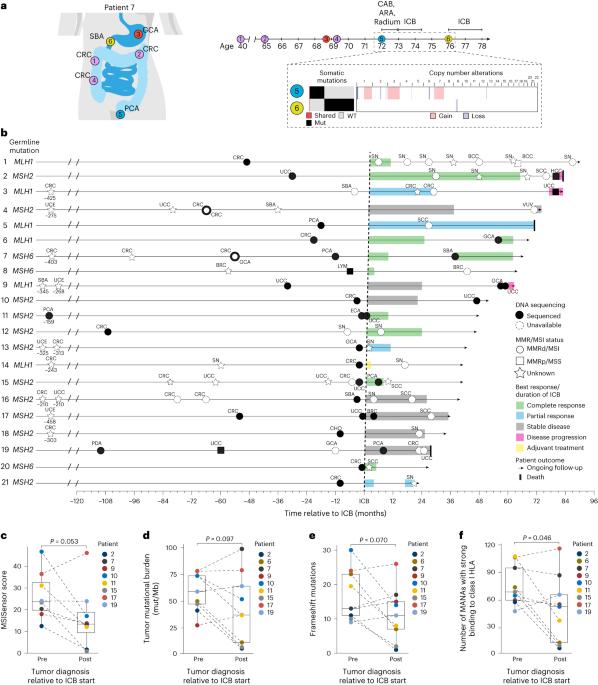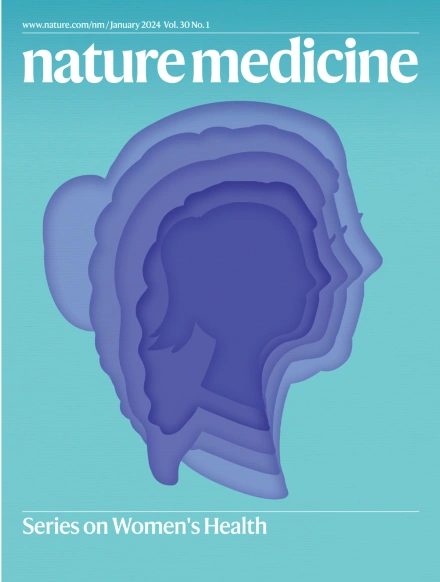Neoplasia risk in patients with Lynch syndrome treated with immune checkpoint blockade
IF 58.7
1区 医学
Q1 BIOCHEMISTRY & MOLECULAR BIOLOGY
引用次数: 0
Abstract
Metastatic and localized mismatch repair-deficient (dMMR) tumors are exquisitely sensitive to immune checkpoint blockade (ICB). The ability of ICB to prevent dMMR malignant or pre-malignant neoplasia development in patients with Lynch syndrome (LS) is unknown. Of 172 cancer-affected patients with LS who had received ≥1 ICB cycles, 21 (12%) developed subsequent malignancies after ICB exposure, 91% (29/32) of which were dMMR, with median time to development of 21 months (interquartile range, 6–38). Twenty-four of 61 (39%) ICB-treated patients who subsequently underwent surveillance colonoscopy had premalignant polyps. Within matched pre-ICB and post-ICB follow-up periods, the overall rate of tumor development was unchanged; however, on subgroup analysis, a decreased incidence of post-ICB visceral tumors was observed. These data suggest that ICB treatment of LS-associated tumors does not eliminate risk of new neoplasia development, and LS-specific surveillance strategies should continue. These data have implications for immunopreventative strategies and provide insight into the immunobiology of dMMR tumors. In a retrospective analysis of patients with Lynch syndrome and primary cancers treated with immune checkpoint inhibitors, 12% developed subsequent malignancies, suggesting that this treatment may not eliminate risk in individuals predisposed to mismatch repair-deficient cancers, and ongoing surveillance is warranted.

免疫检查点阻断治疗林奇综合征患者的肿瘤发生风险。
转移性和局部错配修复缺陷(dMMR)肿瘤对免疫检查点阻断(ICB)非常敏感。ICB预防林奇综合征(LS)患者dMMR恶性或恶性前肿瘤发展的能力尚不清楚。在172例接受≥1个ICB周期的癌症影响LS患者中,21例(12%)在ICB暴露后发生恶性肿瘤,其中91%(29/32)为dMMR,中位发展时间为21 月(四分位间距,6-38)。61名接受ICB治疗的患者中,有24名(39%)随后接受了结肠镜检查,患有癌前息肉。在ICB前和ICB后的随访期内,肿瘤的总体发展率没有变化;然而,在亚组分析中,观察到ICB后内脏肿瘤的发生率降低。这些数据表明,对LS相关肿瘤的ICB治疗并不能消除新瘤形成的风险,应继续采用LS特异性监测策略。这些数据对免疫预防策略有启示,并为dMMR肿瘤的免疫生物学提供了见解。
本文章由计算机程序翻译,如有差异,请以英文原文为准。
求助全文
约1分钟内获得全文
求助全文
来源期刊

Nature Medicine
医学-生化与分子生物学
CiteScore
100.90
自引率
0.70%
发文量
525
审稿时长
1 months
期刊介绍:
Nature Medicine is a monthly journal publishing original peer-reviewed research in all areas of medicine. The publication focuses on originality, timeliness, interdisciplinary interest, and the impact on improving human health. In addition to research articles, Nature Medicine also publishes commissioned content such as News, Reviews, and Perspectives. This content aims to provide context for the latest advances in translational and clinical research, reaching a wide audience of M.D. and Ph.D. readers. All editorial decisions for the journal are made by a team of full-time professional editors.
Nature Medicine consider all types of clinical research, including:
-Case-reports and small case series
-Clinical trials, whether phase 1, 2, 3 or 4
-Observational studies
-Meta-analyses
-Biomarker studies
-Public and global health studies
Nature Medicine is also committed to facilitating communication between translational and clinical researchers. As such, we consider “hybrid” studies with preclinical and translational findings reported alongside data from clinical studies.
 求助内容:
求助内容: 应助结果提醒方式:
应助结果提醒方式:


